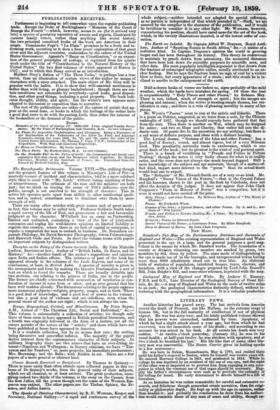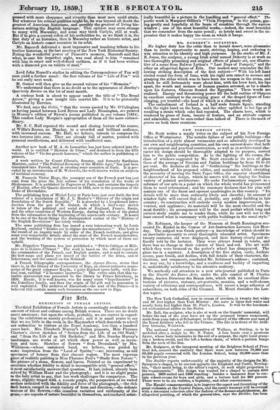LITERARY NEWS.
Another historian has passed away. The last arrivals from America record the death of Prescott, not like Hallam, on the extreme verge of human life, but in the full maturity of intellectual if not of physical vigour. He was but sixty-two; and his lately published volume showed that his powers were untouched, undimned by time. Apoplexy, of which he had a alight attack about a year ago, but from which he had recovered, was the immediate cause of his death ; and according to one account he was seized in his bath. At all events his death was very sudden. "At twelve o'clock yesterday, (January 28,) he was in his usual health ; at half-past twelve he was stricken with apoplexy, and at two o'clock he breathed his last." His life like that of many other lite- rary men was uneventful. The Boston Courier gives its leading epochs in a few sentences— He was born in Salem, Massachusets, May 4, 1793, and resided there until his father's removal to Boston, when he himself was twelve years old. He entered Harvard College in 1811, and graduated in 1814. While in college he was deprived by an accident of the use of one eye, and the sight of the other was so impaired as to prevent him from engaging in any occu- pation in which the constant use of that organ should be necessary. Hap- pily his father's circumstances were such as to preclude the necessity of his toiling for bread. He early determined to devote himself to a life of literature.
As an historian he was rather remarkable for careful and extensive re- search, and felicitous though somewhat ornate narrative, than for origi- nality or philosophic depth. He kept up with the age in opinion, rather than headed it ; and probably the conclusions he drew from his authori- ties would resemble those of any man of sense and ability, though ex- pressed with more eloquence and vivacity than most men could attain. But whatever his critical qualities might be, he was beyond all doubt the greatest of American historians, and possibly the greatest of living his- torians writing the English language. This opinion may seem strange to many with Macaulay, and some may think Carlyle, still at work. But if to give a correct reflex of his authorities be, as we think it is, the first duty of an historian, then is Macaulay rather an historic artist, and Carlyle an historic comet eccentric in its orbit.
Mr. Bancroft delivered a most impressive and touching tribute to his brother historian, at the last meeting of the New York Historical Society. Noting the wonderful power of Prescott's memory, Bancroft said that what, to ease his imperfect sight, was read aloud to him " remained with him in exact and well-defined outlines, as if it had been written with a diamond pen on tablets of steel."
Lord John Russell's studies in editing the Correspondence of Fox will soon yield a further result : the first volume of his " Life of Fox" will be out early next week.
M. Guizot will then give us the second volume of his "Memoirs." We understand that there is no doubt as to the appearance of Bentleys Quarterly .11erielo on the 1st of next month.
A curious book is about to appear under the title of " The Broad Arrow," giving a new insight into convict life. It is to be pictorially illustrated by Hervieu.
We find, says the Critic, " that the verses quoted by Mr. O'Callaghan as having passed between Lord Byron and Lady Blessing-ton, are printed in Murray's edition of Byron's poems published in one volume (1864). This renders Lady Morgan's appropriation of them all the more extraor- dinary.
Mr. S. C. Hall repeated the second and closing lecture of his course, at Willis's Rooms, on Monday, to a crowded and brilliant audience, with increased success. Mr. Hall, we believe, intends to compress the two lectures into ..one. They are already full of matter, pointed with personal recollections, and delivered with unaffected ease.
Another new book of M. A. de Lamartine has just been ushered into the world. It is entitled " Histoire de Cesar," and destined to form the fifth volume of the " Vie des grands hommes," which the author is publishing at preaent.
A work written by Count Cibrario, Senator, and formerly Sardinian. Minister, called "The PoliticalEconomy of the Middle Ages," has just been translated into French, and is creating some sensation at Paris. It is pre- ceded by an introduction of M. Wolowski, the well-known writer on subjects of national economy.
M. Francois Victor Hugo, the youngest son of the French poet has just sent from the press the first volume of his translation of the works of Shakespeare. It is published by Pagnerre at Paris, and contains the tragedy of Hamlet, after the Quarto discovered in 1826, now in the possession of the Duke of Devonshire.
The publishing firm of Michel Levy at Paris have just sent forth the first volume of a translation of Mr. J. L. Mosley's "History of the origin and foundation of the Dutch Republic." It is preceded by a lengthened intro- duction from the pen of M. Guizot, in which a bird's-eye sketch is taken of the political and social state of England, France, Spain, and the other countries of Western Europe, during the whole of the period from the reformation to the beginning of the nineteenth century. It is said to be one of the finest things the distinguished author of the "History of the English Revolution" has lately written.
The same publishing firm has issued a very interesting work by Louis Reybaud, entitled "Etudes sur regime des manufactures. ' This book is the result of an inquiry made by order of the French institute, and gives some very remarkable details about the state of the French manufactories, and the working of the system of protection by which most of them are upheld.
Mr. Hippolyte Vigneron has just published a "Precis Critique et Mili- taire de la Guerre d'Orient." The work is based on the official reports of the commanders of the French and English armies, and is said to contain the best maps and plans yet issued of the battles of the Alma, and of Inkerraann, and the assault on the Malakoff.
A French lithographic correspondence, the Agenee Haves, states that there is, in the library of the University of Riga, an almost unknown manu- script of the great composer Haydn, a quite finished opera buffa, with Ita- lian text, entitled "L'incontro improvise." The writer adds that this va- luable manuscript was presented to the library by Prince Esterhasy, in 1856. Haydn, it is well known, was for many years " kapellmeister" in the Esterhazy family, and thus the origin of the gift and its possession is well explained. The archives of Eisenstadt—the seat of the Prince—it is believed still contain many such treasures as the one now in Riga.



























 Previous page
Previous page